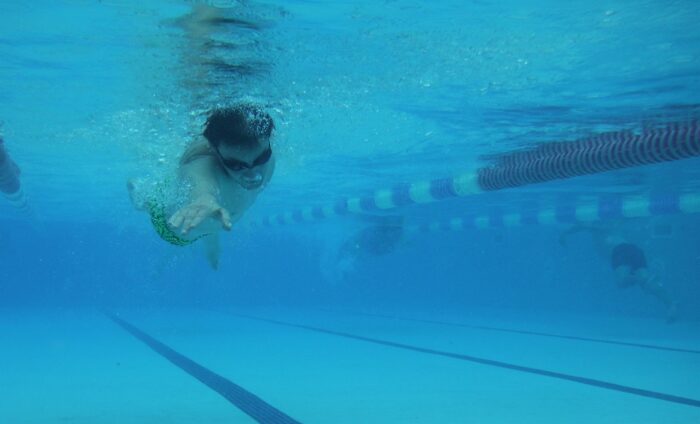
A few reasons why swimming isn’t a waste of time
Last week the Telegraph posted a story with the alarming and misleading headline: “Most swimmers are wasting their time, say doctors.”
Ouch.
The premise for the headline is the suggestion that: “The average person’s ability in the pool is not sufficient to maintain a level of intensity that will enable them to lose weight.”
So there you have it, the sole purpose of swimming – or perhaps any exercise at all – is to lose weight. Speaking for myself, and I suspect many other swimmers, I certainly don’t swim to lose weight, and if I did want to lose weight I would look to changing my diet first.
The context of the article is not entirely clear but if you can bring yourself to read to near the end you will see it’s a report from a discussion at the Royal College of General Practitioners annual conference in Harrogate. Not mentioned is the background that GPs can prescribe exercise as a treatment (or partial treatment) for a range of health issues.
One speaker, Dr Pip Hayes, told the conference: “A lot of people go in [to a local leisure centre] and get a net calorie gain because prominent in every foyer is a great big vending machine, full of junk.”
Therein lies the problem for your GP. If he or she prescribes swimming as a means for you to lose weight but you pig out on junk food instead, the intervention is a waste of time and money. But that’s a long way from the claim that most swimmers are wasting their time, which quite frankly is irresponsible journalism.
The NHS itself recognises that exercise, including swimming, serves a wider purpose than helping you to lose weight. For example, on their website they say: “Regular exercise can boost your mood if you have depression, and it’s especially useful for people with mild to moderate depression.” I know from personal experience and from talking to many of our readers that swimming really can lift your mood, especially swimming outside.
But as well as helping lift your mood, there are several other reasons to swim, regardless of what it does to your weight. Firstly, it’s a great way to keep fit, despite the assertion that the average person’s ability (or rather inability) to swim prevents this.

Swimming outside is an especially good way to lift your mood
According the Telegraph article, “Dr Dane Vishnubala, the GP physical exercise champion for Public Health England, said many people who are sent to the pool to get in shape simply splash around using a ‘doggy paddle hybrid’ and pass the time chatting with friends.”
Now, I don’t see it as the job of the NHS to teach people how to swim, but if lack of swimming ability and knowledge about how to make the best use of your time in the pool is a problem, GPs could do better than simply suggesting people go swimming. They could, for example, direct them to adult swimming classes, a masters swimming club (the club I belong to has a group for people who are new to the sport) or to online resources such as those published by the Amateur Swimming Association. Adding a little structure to your swimming, especially for people with limited experience, will undoubtably bring fitness benefits. Learning new swimming techniques will also provide a mental workout, which may help prevent dementia.
I loved the comment that people will “pass the time chatting with friends.” One of the highlights of being in a swimming club is that I get to chat to my friends when I go to the pool. The health benefits of maintaining your social networks are well documented – how can chatting with friends possibly be a bad thing? Admittedly, many of our conversations are carried out in breathless 10-second snatches between lengths, but you get used to that as a swimmer. I’d definitely list being sociable as a benefit of swimming.
So what else? How about the fact that being in the water just feels amazing? Do you need to justify swimming in terms of weight loss or fitness gain when simply being in water is so awesome? I also love that swimming is relaxing and meditative but also gives you so many opportunities for exploration and adventure.
In the end, exercise in general and swimming in particular, are enjoyable in their own right. When journalists portray sport as a means to an end they do it a disservice. If you exercise to lose weight, you make it a chore you need to put up with, something you would rather not be doing. This is totally the wrong message.
Swimming definitely has health and fitness benefits, but don’t swim because of those, swim because you love it.
You can read the Telegraph article here.
Interestingly, despite the article being about pool swimming, two of the images used are related to open water swimming.






